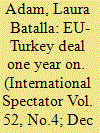| Srl | Item |
| 1 |
ID:
157500


|
|
|
|
|
| Summary/Abstract |
Now in its sixth year, the war in Syria has triggered the largest humanitarian and refugee crisis of our time. For most refugees and migrants, Turkey is the main transit country to reach Europe, where Syrian refugees hope for a better future. However, this journey has been hampered as several European countries closed their borders following the arrival of an unprecedented number of migrants and asylum seekers in 2015. In response, a deal was struck with Turkey to stem the migrant flow to Europe in exchange for some concessions. By outsourcing the management of migration flows to Turkey, the EU is failing to take its fair share of responsibility for refugee protection. Furthermore, as a result of the political situation in Turkey and the unmet promises under the deal, relations between Turkey and the EU have touched their lowest point since the start of accession negotiations in 2005. While survival of the deal is of critical importance as the EU needs Turkey’s assistance in curbing migration flows and Turkey is keen on revitalising its accession negotiations, the deal has exposed serious flaws that need to be addressed and must not be replicated with other countries.
|
|
|
|
|
|
|
|
|
|
|
|
|
|
|
|
| 2 |
ID:
164618


|
|
|
|
|
| Summary/Abstract |
This article argues that because the EU is more concerned with Turkey serving as a barrier to those seeking refuge in Europe, it has empowered the Erdoğan regime to continue to adopt and implement measures that undermine Turkish democracy. Such a myopic approach has allowed Erdoğan to usurp more power, which has had dire consequences for European security as it means that Europe would share a border a with a nondemocratic state. It also makes it harder for the EU to work with Ankara, because if the EU criticizes or imposes sanctions it makes it more likely that Erdoğan would gravitate toward Russia and Iran, thus further undermining European security, as the EU has a complex relationship with these two countries, particularly Russia. It is only by taking some tough decisions on migration that the EU could solve the insecurity challenge that Turkey poses.
|
|
|
|
|
|
|
|
|
|
|
|
|
|
|
|
| 3 |
ID:
180281


|
|
|
|
|
| Summary/Abstract |
The European Union (EU)–Turkey deal consolidated a shift in the EU’s migration policy. The deal is the culmination of the dominance of the security frame and depicts the continuous externalization of the EU’s responsibility of asylum protection and burden sharing. The strengthening of the security frame has weakened the humanitarian norms that previously dictated EU’s behaviour. This has led to the EU losing some of its comparative advantages in negotiations. Simultaneously, the instrumentalization of the value of asylum, paired with an increased number of asylum seekers, has given negotiation leverage to the neighbouring countries turned service providers. These changes in perception and norms have created a power shift, at the disadvantage of the EU, creating a more leveled playing field for negotiations between the parties. This article tracks the historical shifts in the global refugee regime to explain how today’s situation was created. Hereby, the existence of two competing cognitive frames—humanitarian and security—is assumed, tracked and analysed. While looking at the EU–Turkey deal, the article shows that the EU has started treating refugees as a security problem rather than a humanitarian issue, breaking the normative fabric of the refugee regime in the process. The article also displays how Turkey was able to capitalise on this new reality and engage with negotiations of other neighbouring countries of EU that point towards a change of dynamics in the global refugee regime.
|
|
|
|
|
|
|
|
|
|
|
|
|
|
|
|